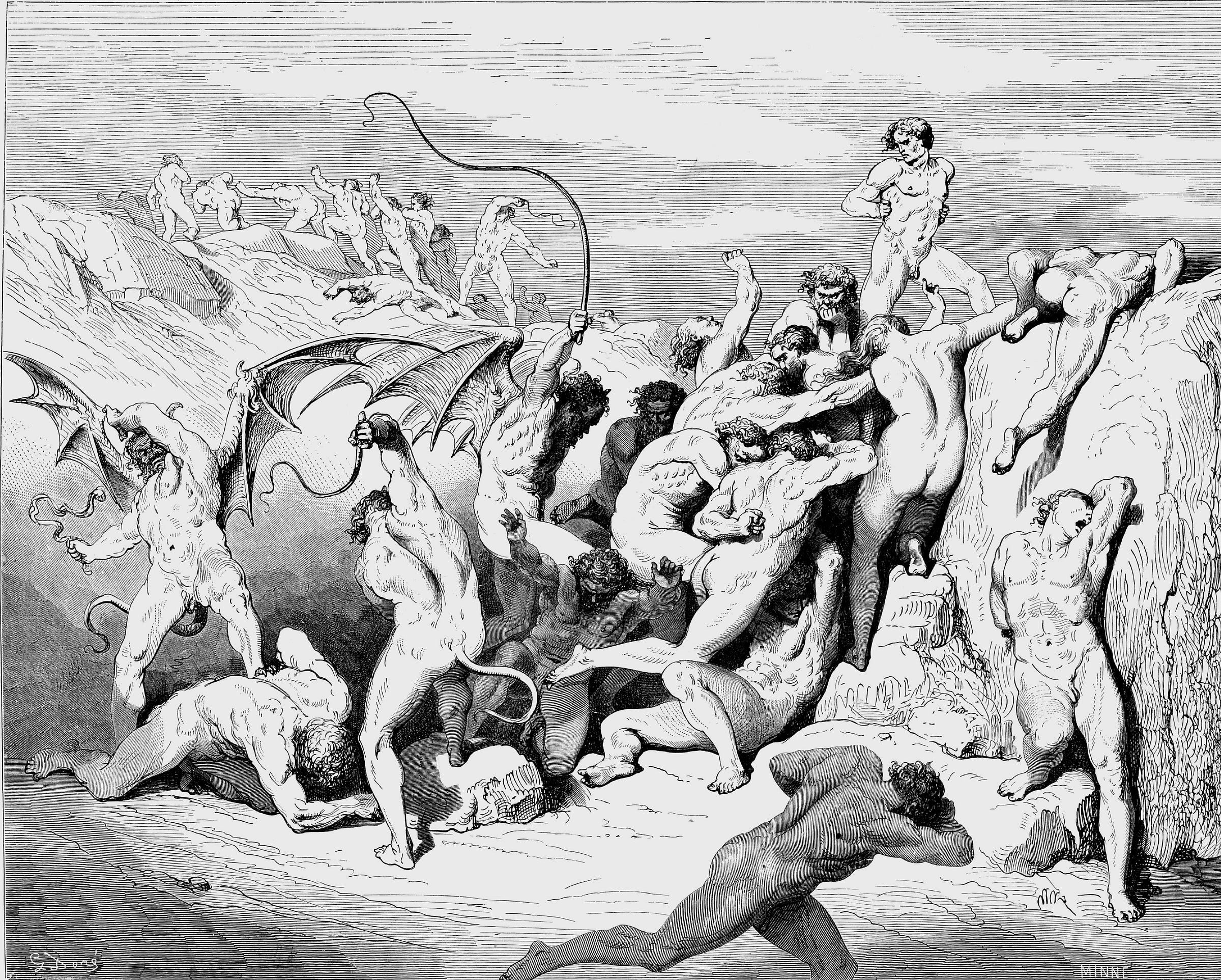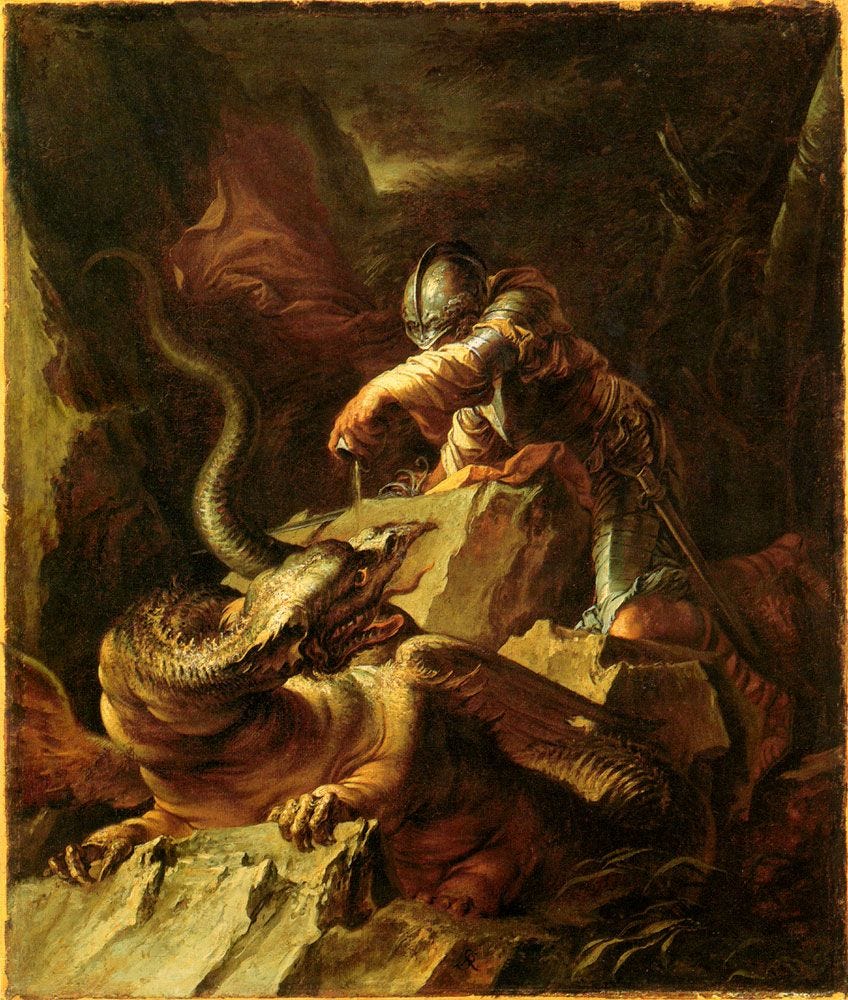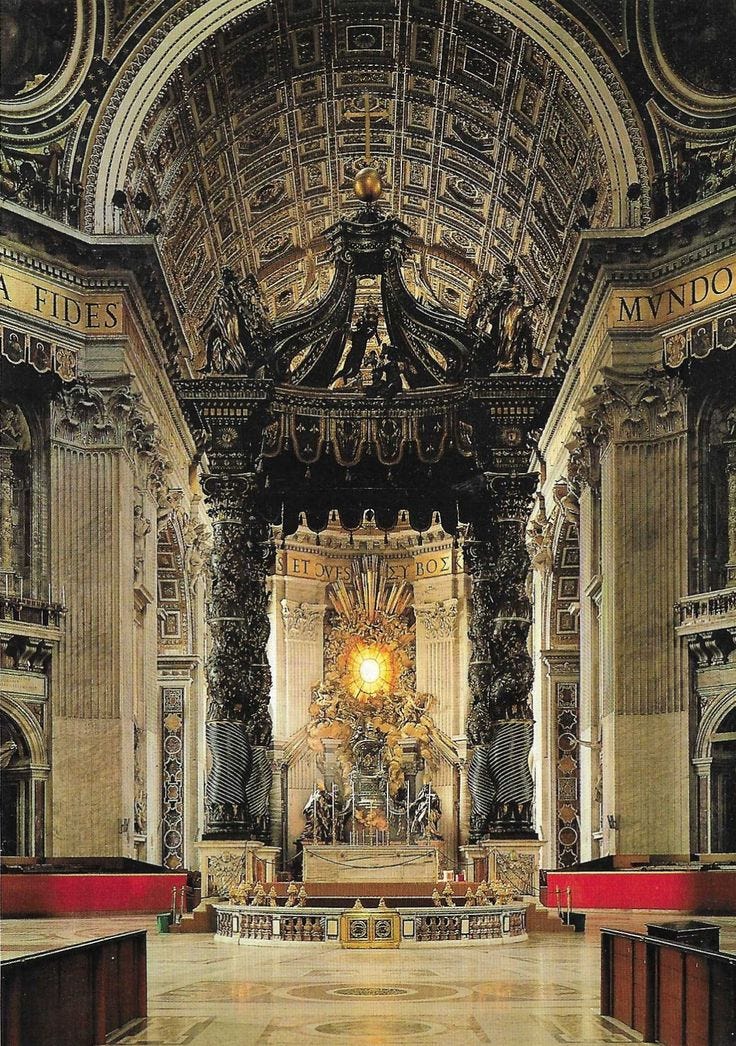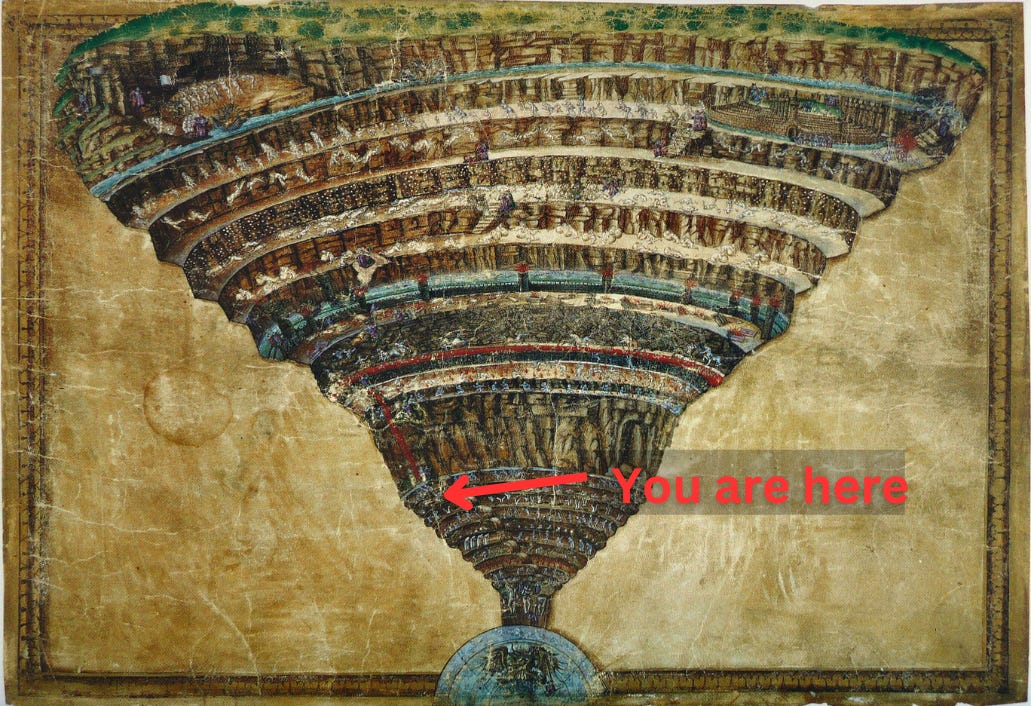What is the Price of Your Soul? (Seducers & Flatterers)
(Inferno, Canto XVIII): Panderers, Seducers, and Flatterers
“When one with honeyed words but evil mind
Persuades the mob, great woes befall the state.”
― Euripides, Orestes
Welcome to Dante Read-Along! 🌒
(If this post appears truncated in your inbox you can read it on the web by clicking here. )
Welcome to Dante Book Club, where you and I descend into Hell and Purgatory to be able to ascend to Paradise. Our guide is the great Roman poet Virgil and in this Eighteenth Canto we enter the Eighth Circle of Fraud and meet the Panderers, Seducers, and Flatterers. You can find the main page of the read-along right here, reading schedule here, the list of characters here (coming soon), and the list of chat threads here.
In each post you can find a brief summary of the canto, philosophical exercises that you can draw from it, themes, character, and symbolism explanations.
All the wonderful illustrations are done specially for the Dante Read-Along by the one and only Luana Montebello.
This Week’s Circle ⭕️
The Eighth Circle of Fraud - The Sins of the Wolf - The Ten Malebolges - Panderers and Seducers in the first trench - They run in opposite directions - Venedico Caccianemico - Bridge to the second trench - Flatterers wallow in filth - Jason - Alessio Interminei of Lucca - Thaïs the harlot.
Canto XVIII: Summary
Dante introduces the architecture of the Eighth Circle of Hell, that of Fraud, the sins of the Wolf. This circle is composed of 10 concentric and progressively smaller trenches cut into the iron grey rock, what Dante has named Malebolges, or “evil pouches.”
These circles create a funnel shape as the trenches grow smaller toward the pit in the center - leading to the Ninth, and deepest, circle of Hell.
The belt, then, that extends between the pit
and that hard, steep wall’s base is circular;
its bottom has been split into ten valleys.
XVIII.7-9
The construction was that of a circular pattern of moats with arched bridges spanning each trench, (XVIII.10-18) each filled with a different category of sinners. Dante and Virgil could walk along the top edge, and then across the bridges, to observe what was below in each trench.
Malbolge is, I think, after a rather special manner, the image of the City in corruption: the progressive disintegration of every social relationship, personal and public. Sexuality, ecclesiastical and civil office, language, ownership, counsel, authority, psychic influence, and material interdependence - all the media of the community’s exchange are perverted and falsified, till nothing remains but the descent into the final abyss where faith and trust are wholly and for ever extinguished. 1
Dante and Virgil are standing where Geryon had placed them upon landing at the end of Canto XVII, and as they began to walk along the outer edge, Dante saw the tortured souls below in the first pouch; where “along its bottom, naked sinners moved” (XVIII.25).
Dante sees so many sinners in the trench that he is reminded of the crowds during the Jubilee in Rome, in which the city was crowded with pilgrims seeking to be granted indulgences. The traffic on the bridge Ponte Sant'Angelo - leading to the Castel Sant’Angelo2 and St. Peter’s Basilica at one end, and to Monte Giordano on the other - was so great that it was organized into two sides flowing in opposite directions.
This first Jubilee of the Roman church was proclaimed by Boniface VIII in his bull Antiquorum habet fidem, dated February 22, 1300…this bull granted indulgence to all who visited the basilicas of San Pietro and San Paolo fuori le Mura on a certain number of days during the year and confessed and repented of their sins.3
The two files of sinners walking in this first trench were the Panderers - or those who deliberately exploit the passions of others,4 and Seducers - each file walking in a different direction. From their first vantage point, the Panderers are walking toward Dante and Virgil, so they can see their faces, while they can only see the backs of the Seducers, since they are walking in the same direction.
This trench is filled with “horned demons with enormous whips” (XVIII.35) striking the sinners, who run and flee from them. Dante sees a soul here whom he recognizes, and as they stop, the soul lowers his eyes in shame, an event that becomes more frequent the deeper we travel. This soul is Venedico Caccianemico. He does not want to speak, but is drawn by familiarity in thinking of the world above, and so tells his story.
For it was I who led Ghisolabella
to do as the Marquis would have her do-
however they retell that filthy tale.
XVIII.52-54
Caccianemico is a Guelf from Bologna, who offered up his sister Ghisolabella for sexual favors to the Marquis of Este.5 After comments to Dante about his fellow Bolognese, Caccianemico is whipped and told to move on by a demon.
Dante and Virgil continue to walk, and came to an arched rocky ridge, the bridge spanning the first and second trenches. Each trench will have such a bridge (except one, which we will discover soon).
We climbed quite easily along that height;
and turning right upon its jagged back,
we took our leave of those eternal circlings.
XVIII.70-72
As they moved over that bridge, they looked back down into the first trench. From this point of view, they could now see the faces of those which previously they had seen the backs of, the Seducers. Virgil points out one famous character to Dante: Jason.
Look at that mighty one who comes
and does not seem to shed a tear of pain:
How he still keeps the image of a king!
that shade is Jason, who with heart and head
deprived the men of Colchis of their ram.
XVIII.83-87
Jason and the Argonauts had embarked on the quest to find the Golden Fleece, which Jason was able to win with the help of Medea, the daughter of the King of Colchis. On his voyage he seduced and abandoned first Hypsipyle on the Island of Lemnos, then Medea, after she had helped him obtain the fleece and flee her homeland.
It is here (XVIII.100) that they cross the bridge to the next trench, the second trench of Circle Eight: the Flatterers.
Their especial weapon is that abuse and corruption of language which destroys communication between mind and mind.6
From the second trench rose foul sounds and odors, assaulting the senses. They could not see into the bottom of the trench from their vantage, and climbed to the arch of the bridge for a better view. And here they saw the foulest sight:
This was the place we reached; the ditch beneath
held people plunged in excrement that seemed
as if it had been poured from human privies.
XVIII.112-114
Even here, Dante sees one he recognizes, although he is so covered in waste that his rank is unrecognizable as a layman or a cleric; the cleric would have a tonsure haircut, so the fact that this is not discernable is indicating how much waste matter was covering his head. This is Alessio Interminei, a White Guelf of Lucca, who, pounding upon his own head, says “I am plunged here because of flatteries - / of which my tongue had such sufficiency.” (XVIII.125-126)
[Alessio] was so given to flattery, that he was unable to say anything at all without seasoning it with the oil of adulation. He greased everyone, he licked everyone, even the most vile and venal servants. In short, he completely dripped with flattery and stank of it.7
But there is one more figure here that Virgil wants Dante to see:
Thaïs, the harlot who returned
her lover’s question, ‘Are you very grateful
to me?’ by saying, ‘Yes, enormously.’
XVIII.133-135
The empty flattery to a paying customer - so convincing that it is believed - is indicative of the kind found here: malicious, soul crushing flattery.
The flatterer always magnifies that which the one for whose gratification he speaks wishes to be large. Wherefore, although that sort of hollow flattery influences those who court and make a bid for it, yet even stronger and steadier men should be warned to be on their guard lest they be taken in by flattery of the crafty kind.8
And with this, they have seen enough.
💭 Philosophical Exercises:
No one has driven me further from religion than the very people who claim to uphold it.
I. Can salvation be bought with gold?
There are 140 statues of saints adorning St. Peter’s Square in the Vatican. Most of the millions of tourists who visit this magnificent piazza each year remain unaware that this grand and ambitious project was one of the key reasons the Church resorted to selling indulgences—pardons that promised to relieve sinners of their transgressions—ultimately sparking the Protestant Reformation.
I remember standing before Bernini’s Baldachin in the Vatican, transformed into marble, unable to move—its beauty, grandeur, and near-divine presence rendering me motionless, as if I had fallen victim to Medusa’s infamous gaze.
Bernini was only twenty-five when he began working on this masterpiece—this celestial canopy that left me speechless nearly a decade ago.
For Dante, as for us today, the notion that redemption could be purchased from the Church was absurd. The idea that a sinner could deceive, steal, or harm others and then simply buy salvation through indulgences struck at the very foundation of divine justice.
This is why we hear these words at the start of Canto XVIII:
as, in the year of Jubilee, the Romans,
confronted by great crowds, contrived a plan
that let the people pass across the bridge,for to one side went all who had their eyes
upon the Castle, heading toward St. Peter’s,
and to the other, those who faced the Mount.(28-33)
About three hundred years before Bernini, in the Jubilee year of 1300, Dante witnessed a similar kind of fraud perpetrated by his arch-enemy, Pope Boniface VIII. For the first time in history, under Boniface’s leadership, the Church sold indulgences promising full forgiveness of sins. Vast crowds flooded Rome, crossing the Bridge of St. Angelo in a procession eerily reminiscent of the damned souls Dante describes in this circle of Hell.
We must pause here and consider the absurdity of indulgences from Dante’s own perspective. To attain salvation and reach Paradise, Dante the pilgrim must endure the torments of every circle of Inferno, ascend the arduous cliffs of Purgatorio, and undergo a profound transformation of the soul. Yet Boniface’s fraudulent offer required no such effort—no journey, no repentance, no struggle. Salvation was reduced to a mere transaction, a fee paid in exchange for eternal absolution.
II.
There is a profound reason why Dante introduces the circle of fraud with this concept. We often see ourselves as victims of deception, yet we rarely acknowledge the ways in which we become its willing accomplices.
Boniface and the corrupt clergy carry their own guilt, and soon we will find them in their divinely allocated place. Yet the crowds that flooded Rome, eager to purchase salvation with gold, share in the blame—they were willing accomplices in Boniface’s fraud.
For many in Dante’s time, whether they dared to say it aloud or not, the idea of purchasing salvation seemed as absurd as it does to us today. History rarely offers definitive answers to questions like Why did this happen?—but when the Church once again resorted to selling indulgences three hundred years later, in Bernini’s time, much of Christendom had reached its breaking point.
In other words, selling indulgences felt as corrupt then as it is does for us now. But, why does Dante begin this circle with this reference? Shouldn’t we explore this when we reach the pouch of corrupt priests and clergy?
III. Two Types of Fraud: Social and Political
For the first time since Canto VII, we encounter two groups of sinners punished together for distinct yet intertwined transgressions. In Canto VII, we met the prodigal and the avaricious—opposite extremes of the same vice.
In this stage of our journey, however, we encounter two distinct groups of sinners—panderers and seducers alongside flatterers. While panderers and seducers corrode the fabric of society, flatterers undermine authority and degrade the integrity of courts.
Panderers and seducers turn what should never be commodified into mere transactions. Friendships dissolve into alliances of convenience, love is reduced to fleeting desire, and true knowledge is replaced by shallow information. Everything becomes a commodity.
This is where we meet Venedico from Bologna who it is said to have offered his sister for sex as a favour to his ally.9 He reduced his own bloodline to a mere commodity.
While panderers and seducers corrode society through commodification, flatterers undermine authority, corrupt justice, and erode trust by assigning false value, exaggerating importance, and manipulating language.
This, I believe, is why Dante begins our passage through the circle of fraud with Boniface’s sale of indulgences. The corrupt pope’s deceitful offer to his followers was both an act of flattery—undermining true authority by assigning false value to indulgences—and an act of seduction—commodifying faith and salvation itself.
This Week’s Sinners and Virtuous 🎭
(Themes, Quotes, Terms and Characters)
The Language of Filth
You don’t need to read this canto in its original Italian to sense the filth, the repulsiveness, the sheer ugliness of its language. It is vulgar—not in the sense of belonging to the vulgus, the common people, but in that it is deliberately crafted to shock, to disgust, to strip away any illusion of beauty or nobility in the sins it exposes.
Paolo and Francesca
By comparing sinners like Paolo and Francesca—whom we encountered before entering the city of Dis—with those we meet in the lower circles of Hell, a crucial distinction emerges.
Paolo and Francesca were condemned for lust; in a fleeting moment, they lost control of their reason and succumbed to sin. The language Francesca uses to recount their fall is poetic, almost seductive in its beauty. But here, in the depths of fraud, the language turns crude, filthy, devoid of elegance or grace.
There is a vast difference between sinning in a moment of weakness and sinning with deliberate intent. To be overpowered by passion is one thing; to scheme and premeditate upon sin is another entirely.
Quotes 🖋️
(The ones I keep in my journal as reminders of eternal wisdom):
I struggled to select a passage from this canto. The reason is not because I was not impressed by Dante’s genius, far from it. I copy down quotes that inspire me, whilst every verse I encountered here repulsed me in one way or another.
Therefore, I thought I would share this quote with you from Friedrich Nietzsche:
“I'm not upset that you lied to me, I'm upset that from now on I can't believe you.”
The world works in a strange way, when we add materialistic value to something that should not and cannot have value, we deprive it of its true worth. It is absurd, for example, to put a price on a friendship.
How much should I pay for you to betray your friend?
Does that sound strange? Yes, because it is.
Nietzsche’s quote will hover above us throughout the rest of our journey, because what fraudsters do, the reason they are so low in Hell, is that they degrade the true worth of the most important things in life. They make commodity out of art, love, friendship, belief, parenthood, work, taste.
It is not the lie itself that damns them, but the corruption of meaning.
Characters:
- Jubilee - A Jubilee was a year of rest and release from debt in the Old Testament. “A jubile shall that fiftieth year be unto you: ye shall not sow, neither reap that which groweth of itself in it, nor gather the grapes in it of thy vine undressed. For it is the jubile; it shall be holy unto you” (Leviticus 25:11-12 KJV).
- Jason - Of Jason and the Argonauts fame. His half brother Pelias had the throne of Iolcus, and promised it to Jason if he could obtain the golden fleece from Aeëtes, King of Colchis. On his way to Colchis, Jason landed the island of Lemnos and met Hypsipyle, daughter of the king, whom seduced and then left behind, pregnant with twins.
The king’s daughter Medea fell in love with Jason and helped him with the tasks needed to obtain the fleece. She then escaped with him and they married and had children. Later, Jason abandoned her to marry Creusa, daughter of the king of Corinth. Medea made a poisoned robe which killed Creusa, then killed their two young children before escaping. The Seneca play Medea is well worth reading, as is The Voyage of Argo by Apollonius of Rhodes for the full stories.
I am done for. Wedding music struck my ears.
Such cruelty! Even I can scarce believe it.
Could Jason do this, with my father gone,
My land and kingdom lost? Abandon me, alone in a Foreign land?
Unfeeling man!
Seneca Medea II.116-120
- Thaïs - While Dante’s attribution of the quote of the character of the harlot Thais from the Terence play The Eunuch, may be incorrect, (he was quoting Cicero, not the play itself, and quoted a misreading of who was speaking) the sentiment of “the habitual exaggeration indulged in by flatterers” (Singleton 327) still holds.
Sayers Hell 185
Both were built by Hadrian.
Singleton 314
Sayers Hell 185
Singleton names the Marquis of Este (317) while Mandelbaum names him as the Marquis of Ferrara (584). Either way, the sin was the same.
Sayers Hell 185
Benvenuto as quoted in Singleton 326
Cicero De amicitia XXVI 99
Mandelbaum, 584



















The flatterers, literally and eternally immersed in sh*t, is a pretty genius invention.
In this essay, I particularly appreciated the quote from Nietzsche, “I'm not upset that you lied to me, I'm upset that from now on I can't believe you,” and this gloss on it: “It is not the lie itself that damns them; it is the corruption of meaning.”